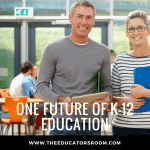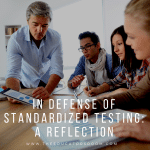This is the time of year in which students’ impetus to volunteer, join clubs, school wide activities, and community drives overrides the necessity to finish out a school year. Many justifications are given for not being in class — and how could I blame them? A record cold winter and delayed spring bloom kept students pent up indoors. Educators must balance learning with exposure to curriculum content, student progress with student awareness, and standardized assessment with school wide finals. Aside from this, I must concentrate on what role technology will play in a 1:1 mobile device classroom. Here is my list of dos and don’ts for the end of the year.
Don’t introduce new content. Current discussion in my social studies department focus on a list of 30 content specific terms for a final United States history unit. As the list grew I found myself gaping in wonder at the complexity of these three tiered terms meant for a majority of students completing their sophomore year. I posed the question; would we be teaching terms with frequency during the last two weeks of class or acquainting students with these terms? In my mind, teaching involves multiple experiences and explicit instruction. To expose students to new terminology is a great idea if it is involves student choice of terms that will be studied and if it involves informal assessment. I have seen teachers give students extra credit opportunities to learn higher tiered vocabulary by presenting this in an interpretive sketch, illustration or video form. Bingo boards with select terms in each space can incentivize students who choose to complete an entire line especially if they can record their work in a space separate from the rest of the class.
Do incorporate physical activity. This time of year I tend to cover famous protests, civil rights movements and campaigns for change. I have access to a cricket game set. I set a standard for work completion for the entire class before introducing a game. I then give a short lecture on games that inspire nationalism or embrace a cultural identity. By comparing the pros and cons of colonialism I make a case for cricket being a game assimilated into India or Pakistan by the British as beneficial. Playing for half a class leads to discussion and pairs well with a document analysis of the game as presented in a Collegeboard resource available to Advanced Placement teachers. But other games work just as well. Mancala, bocce, cards etc.
Do walk and talk. 1:1 devices offer tools and applications that provide sound or video recordings. I will utilize the first twenty minutes for lecture, presentation or guided reading and then direct students to my management platform for a list of curated sources and content specific questions. Students must review some content individually but will earn credit from me upon completion to meet with another student and to walk/ talk around the campus on those related topics. At the end of this experience, they record concluding remarks for submission towards a grade.
Consider final projects which pull from student curations. All year long students keep a vocabulary journal, a geography journal and notes on each unit study. I like to end the year by presenting students with a list of everything that they had learned to map but I give them the choice to determine how they will show a 70% improvement from their first map of the year. Students use the final days of school to practice mapping with chalk on our campus sidewalks as they review notes, the list and other classroom resources. By the final days of class all students are ready to go to task and to provide a self evaluation. On top of this I look at the culminating projects of the last two units and give students the option of choosing which to complete. Class provides emphasis on pertinent studies as well as sample and model designs from year’s past. Students will connect to one particular event or presentation and incorporate this into their own. Teachers are drawn into thinking that all students need to complete all tasks and content assigned often set a frantic pace for completion. I have realized that this pace can expand a gap between those who always complete work and those who struggle to stay motivated. If the goal is to have students exiting school with pride in what they learned than this traditional method does more harm than good.
Do include final reflections– I often host the questions, what have you learned this year that is of value to you? What do you hope to excel at in the future? Open ended questions imply value of a student’s opinion of learning. Their answers help me understand how educational standards equate to what they really think they learned. These honest and raw opinions tend to prepare me for the upcoming year with a greater sense of humility and hope.




